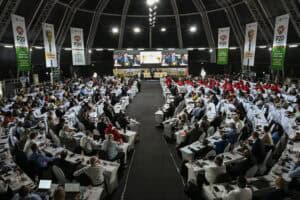Young leaders advocate for inclusion in key ministerial roles amid calls for transformative governance reforms.

With President Cyril Ramaphosa expected to announce his Cabinet soon, there is mounting pressure and advocacy for the integration of younger voices into key ministerial positions.
Sihle Lonzi, president of the EFF’s Students Command (EFFSC) argued that before discussing Cabinet positions, it was crucial to align with a government committed to transformative change in governance and policies.
“We must first understand the government’s vision and programmes it intends to implement. Is it maintaining the status quo or aiming for transformative change in South Africa’s ownership structure?” he asked.
“We are not interested in getting into a Cabinet that will have the likes of FF+ [Freedom Front Plus), who are calling for the independence of Orania.
ALSO READ: ‘Only the President has the final say’ – Mbalula says GNU can’t be ‘held ransom’ by a single party
“And the likes of the DA, which is saying we must scrap Nsfas [National Student Financial Aid Scheme] and students must take loans from the banks.”
However, Lonzi said he believed young people could add an impact in departments such as higher education and training, small businesses, particularly for young black entrepreneurs, and employment and labour.
ANCYL also calls for youth in Cabinet
Last week, during a media briefing, ANC Youth League leader Collen Malatji urged Ramaphosa to appoint young people as ministers and deputy ministers.
He said the youth league had seen the inclusion of about 20 young people under the age of 35 as parliamentarians.
“This is a positive step towards ensuring our leadership reflects the demographics of society, where the youth form a substantial part.
“Though we have not yet reached all our targets, these outcomes provide hope that our leadership will increasingly mirror the youthful and dynamic nature of society,” said Malatji.
However, Tessa Dooms, director at Rivonia Circle, believes the chances of younger people becoming, say, a foreign minister in Ramaphosa’s Cabinet were very low due to several factors.
“This new arrangement of a multiparty coalition arrangement means the ANC itself has less space for broadening its pool of ministers to choose from,” she said.
“Given the ANC’s own history with not trusting younger people with full [minesterial positions] – youth in particular, especially those under the age of 35 – it would be unlikely they start doing that now in a context where there’s already a big reduction in the number of departments they will have.”
Dooms said a party like the DA was already fighting hard to get a higher number of departments and would likely fill them with people with more governance experience than the younger people in their ranks.
ALSO READ: ActionSA won’t be signing up to GNU, says Mashaba after ANC meeting
Thabang Motswaledi from the department of politics and international relations at NorthWest University said the inclusion of young people in the Cabinet could bring benefits in understanding international and domestic policies, which were crucial amid global political and economic changes.
“But, challenges may arise from radical ideas that young people advocate, which may not align with practical implementation in SA, especially when comparing policies with countries like Sweden and how policies like [National Health Insurance] is applied,” he said.
He emphasised “young representation could impact governance by ensuring policies address the everyday challenges of ordinary South Africans”.
Ewan Dawkins, political director at SoWeVote, said there was a deficiency in the quality of youth preferred for parliament.
“We lack the quality of youth that we would prefer. The current young individuals in parliament fall into two camps: the Liam camp of old ideas with a young face, and the young leaders who lack political education,” he said.






